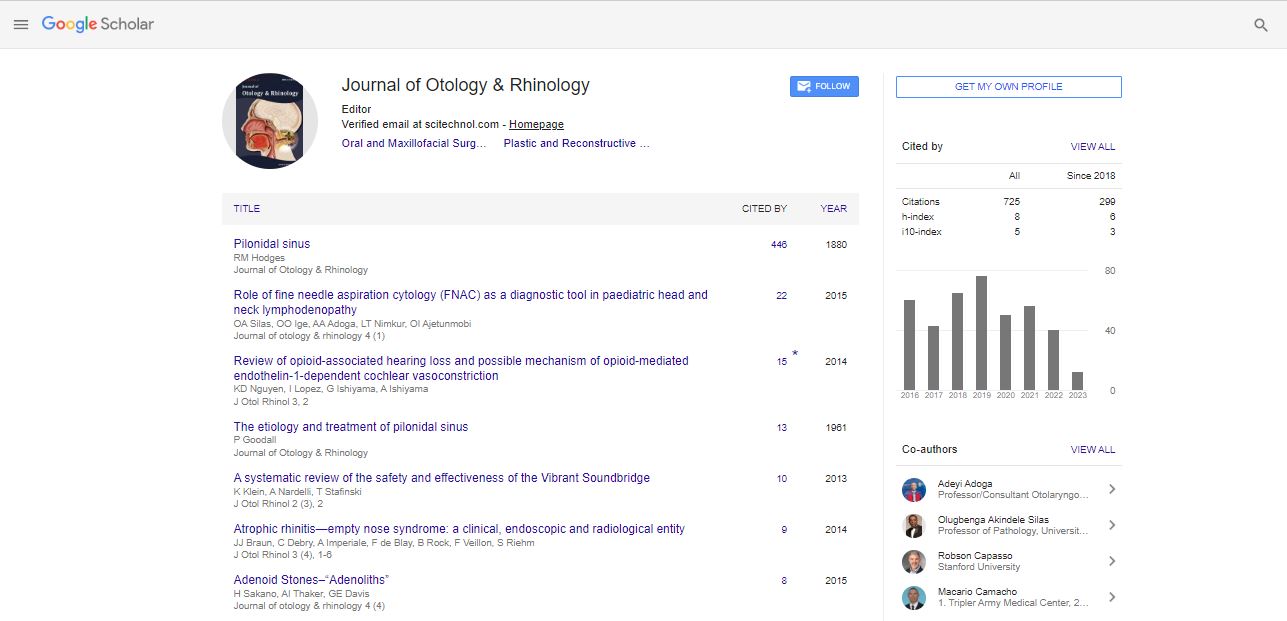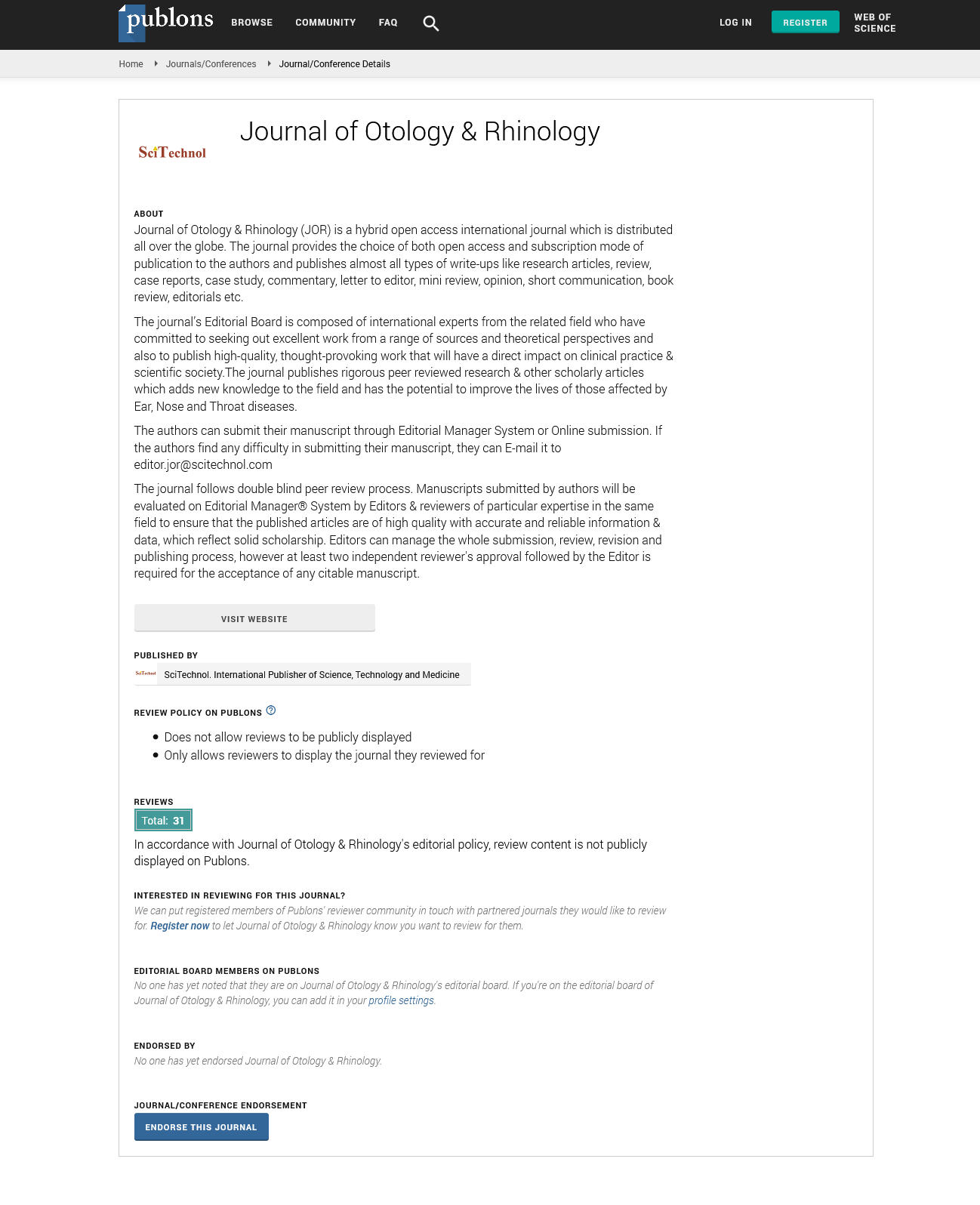Perspective, J Otol Rhinol Vol: 12 Issue: 1
Taste Distortion: Exploring Dysgeusia and Its Management
Mehtap Cohen*
1Department of Pathology, Universidade Federal de Minas Gerais, Belo Horizonte, Brazil
*Corresponding Author: Mehtap Cohen
Department of Pathology, Universidade
Federal de Minas Gerais, Belo Horizonte, Brazil
E-mail: cohenmehtap@gmail.com
Received date: 06 January, 2023, Manuscript No. JOR-23-95120;
Editor assigned date: 10 January, 2023, PreQC No. JOR-23-95120 (PQ);
Reviewed date: 24 January, 2023, QC No. JOR-23-95120;
Revised date: 31 January, 2023, Manuscript No. JOR-23-95120 (R);
Published date: 07 February, 2023, DOI: 10.4172/2324-8785.100042
Citation: Cohen M (2023) Taste Distortion: Exploring Dysgeusia and Its Management. J Clin Image Case Rep 7:1.
Description
Taste, or gustation, is one of the five senses that allows humans to perceive different flavors and enjoy the pleasure of eating. However, sometimes taste perception can become distorted, leading to a condition called dysgeusia. Dysgeusia is a medical term used to describe a persistent, abnormal alteration in taste perception, resulting in a metallic, bitter, sour, or otherwise unpleasant taste in the mouth. Dysgeusia can affect one's quality of life, as it can interfere with appetite, nutrition, and overall enjoyment of food. This manuscript, provide an overview of symptoms, and management of dysgeusia.
Causes of dysgeusia
Dysgeusia can be caused by various factors, including:
Medications: Certain medications, such as antibiotics, antihistamines, diuretics, and chemotherapy drugs, can cause dysgeusia as a side effect. These medications may alter the normal functioning of taste buds or interfere with the way taste signals are transmitted to the brain.
Medical conditions: Dysgeusia can be associated with certain medical conditions, such as upper respiratory infections, oral infections, hormonal imbalances (e.g., hypothyroidism), vitamin and mineral deficiencies (e.g., zinc deficiency), diabetes, and neurologic disorders (e.g., multiple sclerosis).
Dental problems: Dental issues, such as gum disease, oral infections, dental procedures, or the use of dental appliances (e.g., dentures), can affect taste perception and lead to dysgeusia.
Aging: As people age, their sense of taste may decline, leading to dysgeusia. This is believed to be due to changes in taste buds, as well as decreased saliva production and altered oral sensations.
Symptoms of dysgeusia
The most common symptom of dysgeusia is a persistent altered taste sensation in the mouth. The taste distortion can vary from person to person and may include metallic, bitter, sour, salty, or sweet tastes. The intensity of the abnormal taste can also vary, ranging from mild to severe. In some cases, dysgeusia may be accompanied by other symptoms, such as mouth dryness, mouth ulcers, or bad breath. Dysgeusia can also impact appetite and lead to changes in eating habits, resulting in poor nutrition and weight loss.
Management of dysgeusia
The management of dysgeusia depends on the underlying cause. Here are some common approaches:
Medication review: If dysgeusia is suspected to be medicationinduced, reviewing the patient's medication list with a healthcare provider may help identify the culprit drug. Adjustments to medication dosages or switching to alternative medications with fewer tastealtering side effects may be considered.
Treating underlying medical conditions: If a medical condition is causing dysgeusia, treating the underlying condition may help improve taste perception. For example, treating an oral infection, managing diabetes, or correcting hormonal imbalances may alleviate dysgeusia symptoms.
Oral hygiene and dental care: Maintaining good oral hygiene, regular dental check-ups, and addressing any dental problems, such as gum disease or oral infections, may help improve taste perception and reduce dysgeusia.
Dietary modifications: Experimenting with different flavors and textures of food, avoiding foods that worsen dysgeusia (e.g., very spicy or very sweet foods), and increasing the intake of strongly flavored foods (e.g., sour or bitter foods) may help mask or overcome the abnormal taste sensations.
 Spanish
Spanish  Chinese
Chinese  Russian
Russian  German
German  French
French  Japanese
Japanese  Portuguese
Portuguese  Hindi
Hindi 


